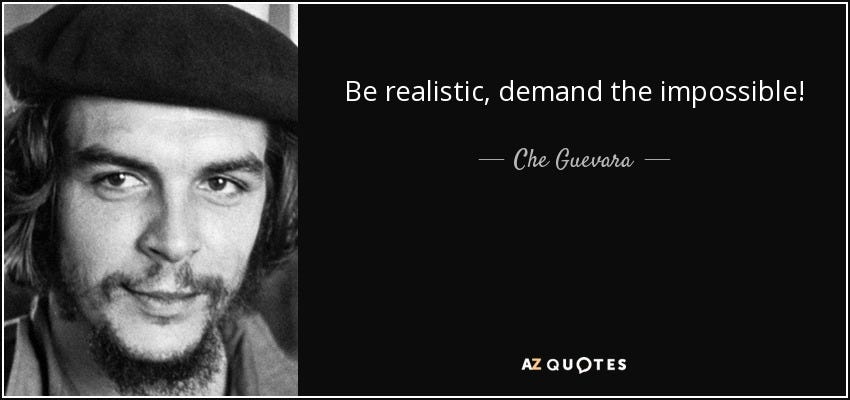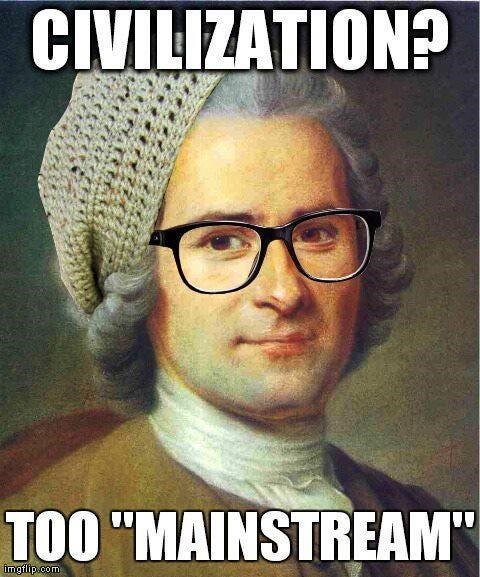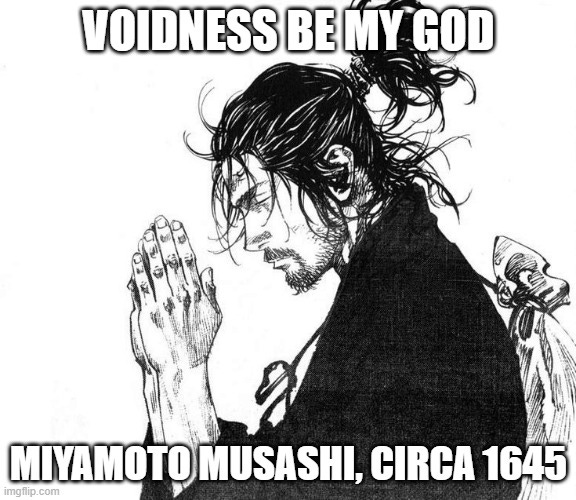Degreebling 4/4: Praxis
Mysteries of the Void and Why Lightcone is a Bitch
Have you studied the Blade?
I have - 69 confirmed Cyberpunk kills with my stealth katana build. My blade is degreebled, but I am not the blade.
I'll go back to that bit later.
We arrive at the finale of the degreebling series. I've been describing the concept and then examined its relation to our feeling of meaning. There is one more thing left to do. It is finally time to decide once and for all what we should do about this duality. We need to face the normative question: how should we approach this? Should we greeble? Should we de-greeble stuff? Maybe sometimes it's good to greeble, sometimes not?
Can We Decide at All?
Suppose we frame the problem with utility as a function of degree of degreebling. How to find local optima then? What is the global one?
We need to start examining our normative options systematically. What is possible is determined by what is, thus knowing reality is the first step. Then we need to see what is the action space - what is possible. Only then we can see what is desirable (value function, to continue the machine learning analogy). This order is important, to not demand the impossible.
In the end we need to examine what is the 'default' gradient, when we're not acting purposefully. That is, where do our intuitions and biases lead us?
That is quite similar to planning a vacation with a small budget, or planning a sailing route - comparing the reachability of different bays, lagoons, depending on the ocean currents and wind patterns.
But what are the specifics in our case? Reality is the patterns of greebling out there. Action space question is equivalent to asking whether we can meaningfully choose actions that go in one of the directions. Maybe in some universes we can only choose from a variety of greebling actions, degreebling being forbidden to us. Maybe in others we can do either, but reality recoils in violent homeostasis, applies the opposite vector and our efforts are in vain?
What is desirable - that is the parameter with most degrees of freedom. 'Perpetuating existing empirically human values' is a common one here - used by Aristotle, human rights tradition and AI safety theorists. It will be good enough here, feel free to substitute it though.
Default gradient question is in a sense already covered by reality and action space points, but it is worth separating it out from a pragmatic perspective. Maybe not-acting, or acting as little as possible, wu wei Daoist style is the Way?
Let's take a deeper look at the question of reality first.
Guiding schema - combinations of cases
It is not only the noumenal greebling we need to care about here. Our epistemic greebling does not exist in a void.
Let's go back to the distinctions from the first post. There I referenced the 4 classes of Universe - the noumenal greebling domain. Now the same can be said of epistemic greebling. We can divide thinking into these 4 classes, and get 16 different worldviews-real world cases.
There are universes where critters share the same class of degreebling in their head, as it is for real. Many worldviews center the veil of reality separating the two realms of degreebling, so it is worth looking into.
It's kind of similar to Pascal's wager - there's also rows - realities and the third, Combination column is the name of a POVs that says that, ending up with game-theoretic 4 outcomes for each choice. Here we have 16 of them.
For reference
1 = goes static (One God Universe)
2 = cyclical (Cyclical)
3 = random (Chaotic)
4 = mix of 2 and 3 (Enchanted)
“Real is 1” options
Classical Theism = full certainity, Eschaton close
Tragic Microuniverse = a microcosm where critters come up with new and new theories, but never reach the complexity
Dumb Microuniverse = full of dumb critters that never realize the patterns that are out there. That's how Christians see those who do not fear Hell.
False Enchantment = that's a One God Universe proponent - supremacist of a race or religion - sees 'live and let live' liberals
“Real is 2” options:
Failing to see beyond the Horizon = that is when you think the ending is a final one, while the ending itself has contradictions that will fail it. That's what Fukuyama did.
Perennialism = embracing cyclicality
Noncoiner = 'bruh, all that stonks it's just RNG. I'm happy that I don't gamble' -statement dreamt up by the utterly deranged, failing to leverage the patterns that exist.
Benign mistake = when you see regularity, just fail to see the top level is cyclical. The cycle is probably much longer than you live, so it's not a great loss.
“Real is 3” option:
Illusion of order: I want unity = the purest cope, a vision of divine order and meaning in a chaotic world. That's what existentialists often portray as a depressive POV, and suggest embracing the meaning in the chaos instead.
Illusion of order: I want repetition = gambler's fallacy - ignoring believing in a depletable stack of luck
True Chaos Existentialism = the world is chaotic and so are you. You are the master of your destiny yet you accept the fate given to you. Mindset of the postmodern antihero.
Local structure is fine = secular humanism in its exoteric form. Yes, the world is random and uncaring, but we humans are caring critters and can make life better for ourselves and those around us.
“Real is 4”:
One God Universe imposing itself on the multiplicity of forms = transcendentaling order disregarding local forms. Immanentizing the Eschaton. Was it like this when in 1910s Confucian China was rejected by the New Culture Movement?
Boomer business as usual = Underestimating the RNG and singularities = "bruh, they've been doom-signaling for decades. I lived through many ends of the world. It's going to be business as usual this time too."
Seeing only chaos = low agency mindset, proper to poor people.
the Balanced View = aligning with the flows
I'll leave these for you to ponder.
It is time to talk about the action space now. Let's see the upper and lower bounds on success of our degreebling or greebling efforts.
We surely can't degreeble to an absolute degree!
Lower Bound - Degreebling Is Cosmically Inevitable
Why do we degreeble? Degreebling is data compression into patterns. This question is deeply biological, or in the abstract sense, to have to do with information processing of self-perpetuating systems.
Degreebling is an abstraction. It is extracting patterns from data, and then using the patterns to predict - construe laws of the environment.
The primary result of human degreebling is language.
Do bacteries degreeble data they receive from their environment?
I don't know. Wait, they probably do, and have low signal resolution. We as apex predators can discern these patterns much better.
Predators are better at this than prey, as failed pattern detection leads to going hungry one day, not dying. The exceptions are prey that puts up good defense - wooly rhino for instance. And a group animals can learn from failure by observing fallen comrades. That's why humans got intelligent.
Some say the preconquest mentality was a blessed state, Garden of Eden, identical to Australian Dreamtime. It is true that it happened, and was dreamlike. I say it is a state of exception, a complacent, lost people. To venerate such a condition is to be guilty of Neo-Rousseau-nism.
It was the time of human history where we've mastered our surroundings - no immediate threat from the Outside, and the internal psyche wasn't assailed anymore with the complexity of the world, yet no new threats emerged yet.
There is always the potential for the perility of the Other. It is dangerous to forget it.
The options are like this: 'unthinking' animals, 'reflecting animals', 'postreflecting utopia'. That latter state is the Garden of Eden.
First and last state greeble. The middle state degreebles and schemes. Maybe only that state is truly alive, and the other states are mere vegetation.
It is not like this pattern is unique to genus Homo.
I am a strong corvid-appreciator. They are capable of both intraspecies symbolic communication and treading the thin risky line of trust.
The Other needs to be treated with caution, even in the conditions of greatest abundance.
See this ‘how to befriend a crow video’!
That is the condition you have to be an agent in this universe. The minimum of degreebling, awareness of self and its separation from the environment.
Recognition of patterns is a cosmic necessity in so far as there arise environments that create complex agents AND these complex environments are too complex for genetic adaptation across generations and cognitive adaptations are incentivized.
Yes, I adopt the Strong Anthropic principle, how could you tell? There is a thermodynamic elaboration detailing this reasoning, if you're interested.
Ok, so now we have the lower bound, what about the upper bound?
Estimating the Upper Bound
What are the limits of degreebling? We don't need to invoke ancient evolutionary pathways nor thermodynamics in this case.
That is a simple agent-environment problem, much simpler than the lower bound in fact.
What is the largest possible degree of degreebling? What is the Endgame?
In regards to epistemic final-patterns, the Endgame is epistemic. It is a location that you'll achieve with enough knowledge. Ecclesiastes says there's only suffering and pain. And the IQ shredding theory says, intellect and understanding don't create much reproduction. Buddhism, by many taken to be the most sophisticated religion, is dying out in its native habitat.
Agent's upper bound on correct predictions of the environment, assuming decent data analysis pathways internally is a function of 3 things: its data gathering capacity - to see stuff when it happens, accidental exposure to the right patterns - to be there when stuff is happening, and the changeability of the environment - how often is your knowledge proven wrong by the external changes to your surroundings, rendering previous models wrong.
Let's examine failure modes of each of these.
If you're a dog, many things humans do are utterly bizarre. That is processing power failure. Sensory data is there, brains are not enough in many breeds.
Data gathering failure is when a human doesn't notice odorless neurotoxins. TBF it's hard to get the right patterns too in that particular case.
Rationalist movement focuses on doing the right updates given data. Bayesian prediction, updating priors, etc. That is very good, but doesn't change these bounds. These bounds are partly internal to our material nature and sensory limitations (1st part, data gathering), but partly these are the Absolute and Accidental circumstances of the Universe we're in - the 2nd (exposure) and 3rd (changeability). There is data forever lost to time, irrevocably lost to entropy.
Lightcone is a bitch.
But wait! There are simple universes, such as the ones from cellular automata from part 1 of this blog post series! And for them you can compute the endgames! There you can predict everything!
That is a correct observation, that's what Laplace thought with his demon experiment. Really diabolical. There is a bunch of problems with having predictors be part of the universe they're predicting, a problem analogous to time travel paradoxes. Also chaos theory.
Still the Universe undoubtedly has end-states. Unsure if it's possible to be certain if we're in one. Our framing of this is increasingly isomorphic to the stopping problem. And that is not perfectly solvable, you can only estimate it. Best we can do is point in some rough direction, even that is not fault-free.
Correct degreebling of the whole Universe is bounded in the general case by the stopping problem. Not only that, but in a specific agent case it is limited by the circumstances of their existence. Throwing more compute won't help if your observations are biased.
Now we have described the upper and lower limits of the degreebling landscape. But is it uniform or textured? Who argues for which direction?
Regions Of Degreebling
There are various kinds of degreeblings, as different sets of heuristics.
Degreeblings of social theories are ideologies. Not all have the same degree of degreebling. As mentioned in part 1, we can see Kuhnian paradigms as local degreebling optima, with revolutions being a scaling of some wall. In Deleuzian terms, that action is deterritorializing. And the local degree of degreebling largely mirrors Deleuzian plateaus - robust and attractive regions in the state space.
Now we arrived at a more nuanced view, where greebling is necessary and bounded from up and down in the Universe.
But how should we operate in our local landscape? Who is pulling towards the degreebled plateau and who towards the greebling walls?
Anti-Degreebling (Pro-Greebling) Camp
The original article by @antlerboy sees greebling as a process that we witness. Little is there for any active role.
The article is definitively pro-greebling, and rejoicing in that.
That's a quite postmodern position. I said in post 1:
Degreebling is modernity. Scientific method is a degreebling-engine. Yes, logical positivists land in the same bucket as fundamentalist monotheists.
Yet mainstream science hasn't had a paradigm shift in a while. It's greebling now. No one expects large shifts, much rather only filling out some small hole in our knowledge. Does it have anything to do with postmodernism?
Postmodernism at large is very pro-greebling. It disrespects Grand Metanarratives, leaving out local ones. But when Geist loses the will to fight, Chthonic forces take over...
Marx's bloodthristy Capital, Landian demons are the Great Greeblers. Geist ceded the Control to entities operating in greeble-mode. Be it rent seeking or market dynamics, these are bugman times.
There are more examples of this all over the sciences...
Brooks' robotics approach, a product of the late 80s is symptomatic of this tendency.
Elephants don't play chess paper is a record of the paradigm of bug-robots.
These creatures don't do symbolic reasoning, they just operate. That's how most of the animal kingdom successfully operates.
Greebling falls on the vitalist side of the noumena - logos divide. There is something creepy about this, and that feeling is captured in Slime Dynamics by Ben Woodward @naughtthought.
There various forms of noumenal contagion are compared: viral, fungoid, and extra-galactic. Biogenic weapons instead of technology, growth without sexual reproduction are all themes of this great read. Author calls the resulting grim mindset "Dark Vitalism".
We can call the whole pro-greebling camp "Dark Vitalism". I disagree with that position. It doesn't take into account the thermodynamic emergence of degreebling. There is only so much you can do without symbolic reasoning.
What is the pro-degreebling camp then?
Pro-Degreebling Camp
Midwit meme variant suggests that it is better to have simple heuristics - to degreeble.
degreebled concepts
@pee_zombie also provides an excellent visual demonstration argument for erring on the degreebling side:
There is also Tolkien and Jung, where simple lives and humble heroism are contrasted with the anonymity of industry and machinery.
Any metanarratives urging retoorn or repair will do the same.
Degreebling as a spirit wants simple solutions, maybe even a bit Apollonian in that sense. (Wait, is all of this just Dionysian vs Apollonian again?)
Anyway, populism or monarchy, or sticking to tradition are much more degreebling than the greebleness of bureaucracy or balancing of powers in a republic, or a ossified theocracy.
With what simple conceptual mindsets coming to influence forms of government, the question of which one to choose becomes ever so vital. How do we choose then?
Way of the Warrior
Before I tell you the Way, you must know one thing. I haven't arrived at the katana mastery in Cyberpunk without long studying the Blade.
I was sitting under a palm tree after the training roughly like this.
I was ingesting ancient knowledge. It was coming from Miyamoto Musashi, a samurai, philosopher, never-bather and Master of the Blade, Olivier Cromwell's contemporary.
His "Book of 5 Rings", chapter 1 contains this passage:
By void I mean that which has no beginning and no end. Attaining this principle means not attaining the principle. The Way of strategy is the Way of nature. When you appreciate the power of nature, knowing rhythm of any situation, you will be able to hit the enemy naturally and strike naturally. All this is the Way of the Void.
And what I mentioned in the beginning
My blade is degreebled, but I am not the blade.
Is to use the degreebling as a tool. To be at the cutting edge of deterritorialization. Reality is often disappointing, but the Way isn't anything weirdly secret. It is just to adapt to the situation. Not to accept any form of degreebling as forever destined, neither to assume any greebleness drive as inevitable. Perhaps one shall triumph locally, but the Universe will hang in balance until the Endgame.
I will talk about Endgame another day, as well as about worshiping the Void.
Conclusion
Here's the end. We know how greebling maps to cellular automata, how it relates to the meaning of our lives, and now we finally see how to approach it.
Now you know when to tell a fren to get more degreebled, and when to warn them that they're degreebling too much.
What's next? The binary of degreebling - greebling is reflective of the ancient monotheism - polytheism debate. I'll discuss that next.
I'll leave you with Musashi's words at the end of his book, the poststructuralist embrace of void / Coldness:
In the void is virtue, and no evil. Wisdom has existence, principle has existence, the Way has existence, spirit is nothingness.










